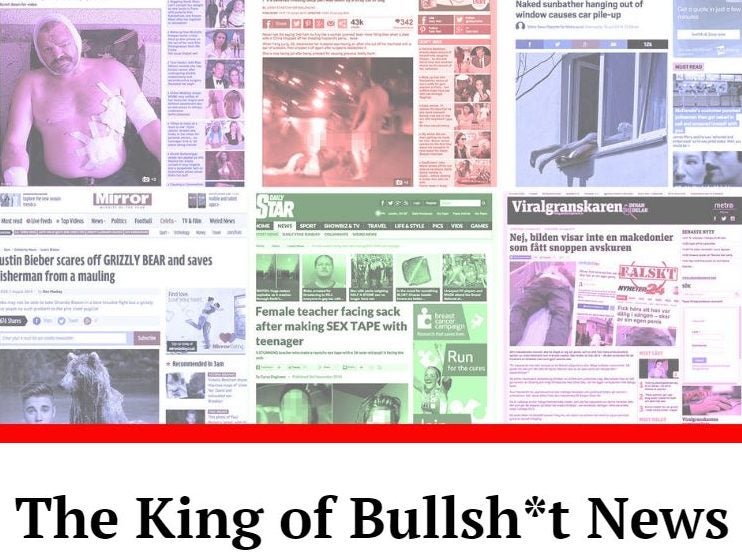
News agency boss Michael Liedig has had his appeal against a libel judgment that backed Buzzfeed’s 2015 story dubbing him the “king of bullshit news” thrown out.
In a judgment handed down yesterday, appeal judges in New York said Liedig and his agency Central European News “simply fail to present any competent evidence suggesting that Buzzfeed’s reporting was false”.
Leidig’s lawyer has said he plans to challenge this latest decision.
Leidig, who is British, launched a claim in the US in January 2016 seeking $11m in damages over the 5,000-word article, which alleged that CEN was “one of the Western media’s primary sources of tantalising and attention-grabbing stories”.
It said CEN had sold a number of false stories originating in non-English language countries, including that teenagers in China were walking cabbages on leads because they were lonely, that a Russian woman killed her kitten by dyeing it pink, and that a two-headed goat was born on a Chinese farm.
The appeal judgment noted that the Buzzfeed article was based on “many months” of investigation by its journalists who concluded that an “alarming proportion of CEN’s ‘weird news’ stories are based on exaggeration, embellishment, and outright fabrication”.
Leidig claimed Buzzfeed’s article had defamed him and CEN by falsely suggesting they were in the business of publishing “fake news”.
But in March, Judge Victor Marrero at New York’s District Court ruled in favour of Buzzfeed and rejected Leidig’s claim ahead of trial.
He found Leidig had offered no evidence to prove Buzzfeed’s claims about the CEN stories were inaccurate.
Under New York law Leidig had to prove “fault” on behalf of Buzzfeed and “either negligence or actual malice depending on the status of the libelled party”, he said.
Unlike UK law, the onus in the US was on Leidig to prove the statements were false, rather than on Buzzfeed to prove they were right.
The appeal judgment notes the original judge’s opinion that Leidig offered no evidence to prove the story about young people walking cabbages in China, and the fact he admitted he “does not know where the quotes in the two-headed goat story came from”.
“For substantially the same reasons as those set forth by the District Court in its thorough opinion, we conclude that plaintiffs’ [Leidig and CEN] claims of accuracy could not be accepted by any reasonable juror,” appeal judges Dennis Jacobs, Susan Carney and Michael Park said.
“Plaintiffs simply fail to present any competent evidence suggesting that Buzzfeed’s reporting was false.”
The judges added that the District Court had “reasonably determined” that Liedig’s “conclusory assertions alone are insufficient to establish a genuine issue of material fact with respect to the falsity of the contested statements made by Buzzfeed”.
Liedig and CEN could have been “expected to have easy access to additional proof of falsity” of Buzzfeed’s claims, it went on, and were “better positioned than Defendants to show whether their reports of two-headed goats, people walking cabbages out of loneliness, and so on, were accurate and substantially true”.
Citing a previous judgment, the judges said: “At a minimum, plaintiffs ‘should have laid a foundation for [their] bald assertion of falsity.’ Without more, their argument fails.”
The judgment concluded that Liedig’s remaining arguments were “without merit” and that Buzzfeed was entitled to the summary judgment.
Lawyer for Leidig and CEN Harry Wise III said: “The Second Circuit’s perfunctory affirmance of summary judgment in favour of BuzzFeed is a decision that should strike fear into the heart of anyone whose reputation has been destroyed by a false and defamatory accusation.
“The decision approves of treating the sworn testimony of a libel plaintiff differently from that of a party in any other kind of lawsuit. The decision relied upon for that supposed rule, Celle v. Filipino Reporter Enterprises, Inc., does not support that idea, and no other court has ever suggested such an unfair rule.
“The appellate decision repeats the flaw of the district court decision, considering the truth or falsity of the defamation without ever ruling on what the defamatory content is.
“Mr Leidig and CEN alleged that the BuzzFeed article accuses them of making up phony news stories, or adding phony quotes to stories, and, specifically as regards M. Leidig, that the article’s assertion that financial problems led Mr. Leidig to search the internet for images he could ‘weave a story around’ was a charge of creating fake stories. The law requires judges, at the threshold of a libel case, to rule on whether the words published can be read as making the charges alleged, but that did not happen in this case, either at the district court or appellate level.
“Mr Leidig declared under penalty of perjury that he has never made up a phony news story, nor added a phony quote to a story, nor to his knowledge has anyone else at CEN done so. Four other CEN journalists were deposed, and testified similarly, describing the steps taken to report stories accurately. None of this evidence was credited by the courts, a particularly serious mistake on a motion for summary judgment, in which judges are instructed to interpret the evidence most favourably towards the non-moving party—here Mr Leidig and CEN.
“BuzzFeed has presented no direct evidence in this lawsuit that Mr Leidig or anyone else at CEN has ever been guilty of journalistic fraud. No direct evidence that anyone has created a fake story, and no direct evidence that anyone has added a fake quote to a story…
“I will seek to have the Court, en banc, consider whether the decision violates both Second Circuit and Supreme Court precedent.”
Email pged@pressgazette.co.uk to point out mistakes, provide story tips or send in a letter for publication on our "Letters Page" blog
